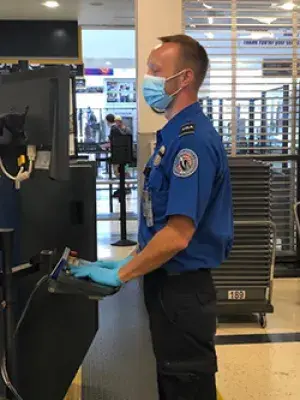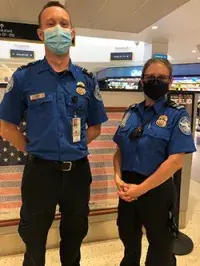
Middletown, Pennsylvania’s Harrisburg International Airport (MDT) TSA Supervisory Officer Nikki Paul was standing curbside one afternoon when she was waived over by a driver seeking assistance with an escalating conflict.
The distressed woman was a good Samaritan, caring for three children of a hospitalized employee involved in an auto accident. The kids, ranging from 18 months to seven years, accompanied her on an errand to pick up her own daughter at the airport. She was parked at curbside when the oldest child became belligerent and began to act out, scratching and punching his siblings and trying to escape from the car.
Paul contacted law enforcement, but when they were delayed, she called the checkpoint and asked TSA Officer Christopher Swisher to meet her outside. Aware of his passenger support, behavior detection and suicide prevention training, Paul knew Swisher was best qualified to help.
“I was unsure why I was needed curbside,” recalled Swisher. “At first I was apprehensive, as we are not necessarily trained for the situation.”
Once briefed by Paul, Swisher jumped in despite initial self-doubt. “I didn’t hesitate to get involved. I sat down in the front passenger side seat and helped make sure that the child was unable to escape through the front of the car and stopped him from hitting his siblings, as that was how he was attempting to express himself.”
A law enforcement officer (LEO) arrived and attempted to deescalate the situation, but was not successful, so for the next 45 minutes, the LEO played bad cop to Swisher’s good cop. “Swisher suggested we remove the other two children from the car to keep them safe,” said Paul. “The LEO watched in amazement as Swisher talked the boy down.”
“I built rapport with [him] in order to gain his trust and empathized with his situation,” said Swisher. “At first, he was not responsive in any way, simply attempting to get away from his current situation any way he could.”
“It wasn’t an easy task,” explained Paul. “Officer Swisher used techniques and skills acquired through his gatekeeper training to ease the boy’s aggression.”
“Gatekeeper training prepared me to handle individuals who are experiencing extreme emotions,” recounted Swisher of his suicide prevention training. He enrolled in the voluntary training because, “Mental health problems are often overlooked and played down and it can be hard to reach out to someone. I think it’s important to be able to help others and to acquire the skills to do it effectively.”
On this day his training, coupled with his own unique childhood, helped him identify the boy’s emotional queues that may have hinted at something bigger going on under the surface. Swisher’s mother ran a day care when he was younger, so “I grew up with a lot of other kids, including younger ones and had to learn how to deal with different attitudes.”
“My ability to be calm and patient with [the boy] and my adaptability to the situation as it evolved were critical in deescalating the situation to where [he] walked out of the car calmly without trying to bolt. By the time I was done, he was asking if I was going to come over later to play.”
Swisher, who is about to become a first-time father in December, says he can fall back on the gatekeeper skills he’s learned in his personal life too. “This was an interesting interaction for me and showed me that I can definitely handle whatever my future child is going to throw at me.”
“Officer Swisher’s strong moral principles, his regard for others and his dedication proves he embodies TSA’s commitment to transportation safety not only to the traveling public, but to the community as well,” said Paul.
“I'm genuinely happy that I was able to help [the boy] and his family avoid an even more stressful situation during a traumatic time in their lives, said Swisher. “I'm glad that I have the training on how to handle a stressful situation and that I have been drilled on critical thinking throughout my career. These aspects were vital in this situation.”

